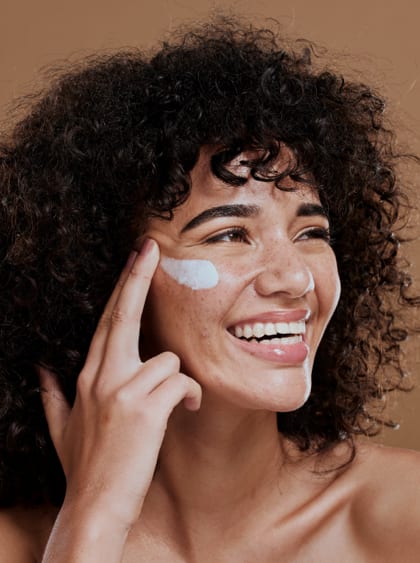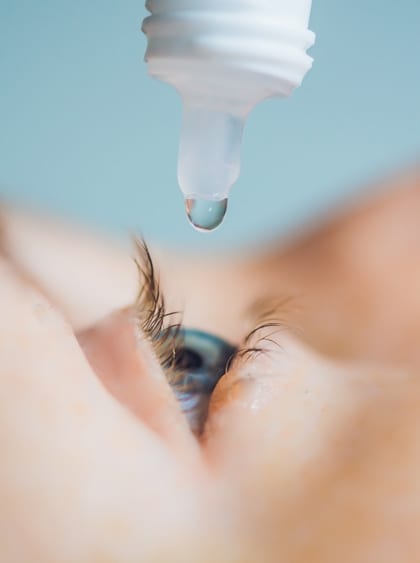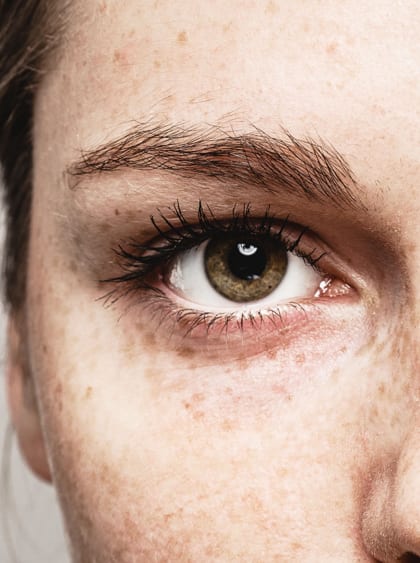Dry eyes are not just a minor inconvenience—they can be a painful and frustrating condition. During an eye exam, we can examine your tear film and eye health to help you find a path to relief. In some cases, an at-home regimen may be the right solution for your symptoms, and there are natural solutions that may help your body produce tears and lubricate your eyes.
Focusing on nutrition could reduce dry eye symptoms. Some of the best nutrients for addressing dry eyes and helping your eyes stay healthy include omega-3 fatty acids, vitamin A, and E.
What Is Dry Eye Syndrome?
Dry eyes can come in like uninvited guests at the worst of times, but they’re all too common for many people—it is estimated that approximately 30% of Canadians experience dry eye symptoms. The dry feeling they cause is more than simply a sensation—dry eyes affect the tear film that protects your cornea, the eye’s clear front dome, and can actually leave your eyes without natural protection.
Tears are essential to the well-being and health of your eyes. They help lubricate, protect, and nourish the eye’s surface. Without a healthy tear film, you may experience any of the following symptoms:
- A dry, burning, or scratchy sensation
- Red eyes
- Light sensitivity
- Mucus discharge near your eyes
- Blurry vision
- A sensation like there is something in your eye
- Excessively watery eyes
What Causes Dry Eyes?
Our tears are a delicate balancing act, and many factors can lead to dryness. In general, there are 2 kinds of dry eyes.
- Aqueous deficiency dry eye occurs when your body doesn’t produce enough tears.
- Evaporative dry eye is the cause of over 85% of dry eye cases and occurs when your tears evaporate too fast, often because they are missing vital natural oil.
Common factors that can contribute to dry eyes include:
- Age: Dry eyes are more common in people over 65.
- Sex: Your biological sex may make you more likely to experience dry eyes.
- Certain medications: Common medications that treat allergies, high blood pressure, and depression could cause dry eyes as a side effect.
- Health conditions: Diabetes, rheumatoid arthritis, and Sjögren’s syndrome are only some health problems that could cause dry eyes.
- Environments: Wind, smoke, and dry environments may cause dry eyes.
Knowing what’s causing your dry eye symptoms is often the first step to finding relief. We can examine your tear health and suggest vitamins for your symptoms.

Omega-3 Supplements for Dry Eyes
Omega-3 fatty acids can be a powerful part of your daily nutrition, but they can be challenging to fit into your meals, as not all foods are high in omega-3. All the same, these fatty acids can be essential for your body’s overall health, including your eyes.
Omega-3s can play a crucial role in reducing inflammation associated with dry eye symptoms. Some studies show that omega-3s can improve meibomian gland function as well. These glands line your eyelids and excrete an oil essential for preventing tears from evaporating.
Meibomian gland dysfunction (MGD) is a major cause of many dry eye cases, so treating it can be essential for getting lasting relief.
Foods high in omega-3 fatty acids include:
- Fatty fish, such as salmon
- Flaxseed oil
- Chia seeds
- Walnuts
- Almonds
Fish is one of the best sources of omega-3s, but not everyone can get the necessary amount of fish into their diet or not be able to eat fish. If you’re not getting enough omega-3 through foods, omega-3 supplements in specific proportions is one step to treating dry eye.
Vitamin A for Dry Eye
Vitamin A is a key nutrient in producing healthy tears and can support your night vision too. Your body needs vitamin A to make the moisture that protects your corneas.
Vitamin A deficiency can disrupt your tear production and leave your cornea unprotected and open to damage. People with malabsorption issues or digestive disorders may be particularly vulnerable to vitamin A deficiency.
Foods high in vitamin A include:
- Carrots
- Sweet potatoes
- Beef liver
- Eggs
- Kale
- Red peppers
- Cantaloupe
Vitamin E for Dry Eye
Vitamin E is a powerful antioxidant that can help reduce inflammation and support your overall eye health. Research is ongoing regarding whether vitamin E can help treat dry eye. Vitamin E is essential to eye health by helping reduce your risk of eye diseases like age-related macular degeneration (AMD).
Foods high in vitamin E include:
- Sunflower seeds
- Almonds
- Spinach
- Broccoli
- Kiwi
- Mango
- Tomato
A Healthy Diet for Healthy Vision
If you’re struggling with dry eyes, incorporating certain vitamins and nutrients into your diet may help you get relief. Omega-3 fatty acids, vitamin A, and vitamin E are only some of the key players in supporting your eye health. Eating a well-rounded diet with plenty of fruits, vegetables, and healthy fats helps cover most of your nutrients to prevent dry eyes.Our friendly team at MEye Health can help you figure out how to adjust your lifestyle, diet and prescribe you the best supplements for dry eye relief. Book an eye exam with us! With a little bit of help—and maybe some extra hydration—you can be on your way to healthy, happy eyes.






















